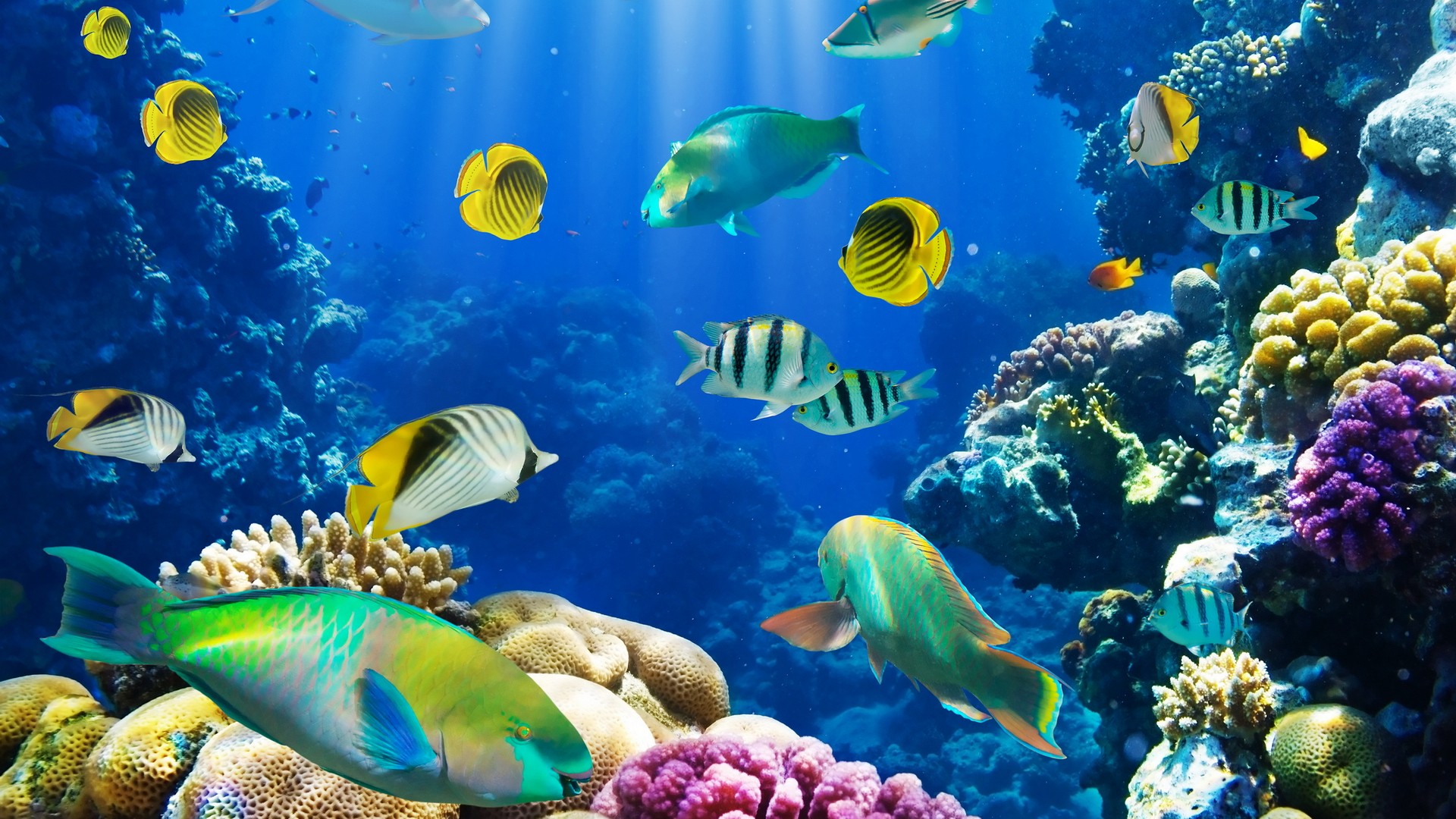Marine Life & Conservation
Global Study Reveals New Hotspots of Fish Biodiversity

Teeming with species, tropical coral reefs have been long thought to be the areas of greatest biodiversity for fishes and other marine life — and thus most deserving of resources for conservation.
But a new global study of reef fishes reveals a surprise: when measured by factors other than the traditional species count — instead using features such as a species’ role in an ecosystem or the number of individuals within a species — new hotspots of biodiversity emerge, including some nutrient-rich, temperate waters.
The study, by an international team of researchers including graduate student Jon Lefcheck and Professor Emmett Duffy of the Virginia Institute of Marine Science, appears in a recent issue of the journal Nature.
Led by Dr. Rick Stuart-Smith of the University of Tasmania’s Institute for Marine and Antarctic Studies, the study team also includes researchers from Stockholm University, the University of Bologna, Stanford University, the Natural Products and Agrobiology Institute in Tenerife, Spain, the Wildlife Conservation Society’s Indonesia Marine Program, the University of Dundee, the Pontifical Catholic University of Chile, and the University of Portsmouth.
The study is based on information collected through the Reef Life Survey program, a “citizen science” initiative developed in Tasmania. The RLS program now operates worldwide, training recreational SCUBA divers to survey numbers of reef animals and supporting their research endeavors.
Stuart-Smith and fellow RLS founder Graham Edgar, also a University of Tasmania professor, highlight the central role the volunteer divers played in contributing to the new study. “The assistance of over 100 dedicated divers has allowed us to look at ecological patterns and processes impossible for scientific dive teams to cover,” says Edgar.
Species richness
The number of different species in an ecosystem — what researchers call “species richness” — has dominated the scientific view of global biodiversity patterns since the days of Darwin and Linnaeus. It has also long been used as a biological basis for management of imperiled ecosystems.
But, says Lefcheck, “Just counting species is a really coarse way of understanding diversity. By gathering information on the animal’s traits — what they eat, how they move, where they live — we can understand more about how dissimilar they are. Dissimilarity is the essence of diversity.”
Lefcheck illustrates the team’s new approach to studying biodiversity by reference to a tide pool. “Consider a pool with a fish, a bird, and a crab,” he says. “Now consider one with three fishes. Which is more diverse? Intuitively, we know it’s the one with the fish, bird, and crab. But until recently, ecologists treated each of them as equally diverse, since they both have the same number of species.”
“Most biodiversity censuses simply count species because it’s relatively easy to do,” says Duffy. “But to understand how species help ecosystems work, we need to know how abundant they are and what they’re doing. That sounds obvious but such data are much harder to get. Ours is the first study to do this comprehensively, and we find that the extra knowledge paints a very different map of global diversity.”
Functional Traits
The team conducted their study by analyzing data from 4,357 standardized surveys conducted by RLS divers at 1,844 coral and rocky reef sites worldwide. The surveys spanned 133 degrees of latitude and found 2,473 different species of fish.
Moving beyond traditional species counts, the research team noted how the members of each of these species make a living, using a detailed matrix of “functional traits.” These include what the fishes eat (plankton, invertebrates, algae, other fish, or a combination), how they eat it (browsing, scraping, or predation), where they live (in, on, or near the bottom or free-swimming), whether they are active at night or during the day, and how gregarious they are (solitary, paired, or schooling).
“Determining the biology and ecology of these fishes — noting what they do and how they do it — alters hotspots of diversity,” says Lefcheck. “Coral reefs remain the most species-rich habitats on earth, but a trait-based view reveals new areas where the diversity of ways in which fishes function is even higher.”
“Functional biodiversity is highest in places like the Galápagos with only moderate species counts,” adds Duffy, “whereas functional biodiversity is low in many classical hotspots with high species counts, such as the iconic coral triangle of the west Pacific.”
Lefcheck notes that the team’s study also looked at how individuals are distributed among species — what scientists call “evenness,” and that doing so further alters global diversity patterns.
“Coral reefs have lots of species but many are doing largely the same thing, whereas temperate reefs with many fewer species tend to spread individuals out among species that are doing different things,” he explains.
Resource management
The team’s findings have important implications for planning and management. Lead author Stuart-Smith notes, “Incorporating information on functional traits into monitoring programs will add an extra dimension and greater ecological relevance to global efforts to manage and conserve marine biodiversity.”
Says Lefcheck, “Loss of species in a community in which all species are doing different things may have greater consequences, since each species plays a unique role that can’t be filled by any other species. Investing resources in conserving the most non-redundant — and therefore vulnerable — communities may have the greatest impact.”
Source: www.sciencedaily.com
Marine Life & Conservation
Double Bubble for Basking Sharks

 The Shark Trust is excited to announce that, for two more days only, all donations, large or small, will be doubled in the Big Give Green Match Fund!
The Shark Trust is excited to announce that, for two more days only, all donations, large or small, will be doubled in the Big Give Green Match Fund!
Donate to Basking in Nature: Sighting Giants
The Shark Trust is hoping to raise £10k which will be doubled to £20k. This will go towards Basking in Nature: Sighting Giants. And they need YOUR help to reach they’re goal.
The Shark Trust’s citizen science project is to monitor and assess basking sharks through sightings; encouraging data collection, community engagement, and promoting nature accessibility. This initiative aims to enhance health and wellbeing by fostering a deeper connection with British Sharks.
Campaign Aims
- Increase citizen science reporting of Basking Sharks and other shark sightings to help inform shark and ray conservation.
- Provide educational talks about the diverse range of sharks and rays in British waters and accessible identification guides!
- Create engaging and fun information panels on how to ID the amazing sharks and rays we have on our doorstep! These can be used on coastal paths around the Southwest. With activities and information on how you can make a difference for sharks and rays!
- Promote mental wellbeing through increasing time in nature and discovering the wonders beneath the waves!
Donate, and double your impact. Click Here
Marine Life & Conservation
Leading UK-based shark conservation charity, the Shark Trust, is delighted to announce tour operator Diverse Travel as a Corporate Patron

 Corporate Patrons provide a valuable boost to the work of The Shark Trust. The Trust team works globally to safeguard the future of sharks, and their close cousins, the skates and rays, engaging with a global network of scientists, policymakers, conservation professionals, businesses and supporters to further shark conservation.
Corporate Patrons provide a valuable boost to the work of The Shark Trust. The Trust team works globally to safeguard the future of sharks, and their close cousins, the skates and rays, engaging with a global network of scientists, policymakers, conservation professionals, businesses and supporters to further shark conservation.
Specialist tour operator Diverse Travel has operated since 2014 and is committed to offering its guests high quality, sustainable scuba diving holidays worldwide. Working together with the Shark Trust will enable both organisations to widen engagement and encourage divers and snorkellers to actively get involved in shark conservation.
“Sharks are truly at the heart of every diver and at Diverse Travel, we absolutely share that passion. There is nothing like seeing a shark in the wild – it’s a moment that stays with you forever!” says Holly Bredin, Sales & Marketing Manager, Diverse Travel.
“We’re delighted to celebrate our 10th year of business by becoming a Corporate Patron of the Shark Trust. This is an exciting partnership for Diverse and our guests. We will be donating on behalf of every person who books a holiday with us to contribute towards their vital shark conservation initiatives around the world. We will also be working together with the Trust to inspire divers, snorkellers and other travellers to take an active role – at home and abroad – in citizen science projects and other activities.”
Paul Cox, CEO of The Shark Trust, said:
“It’s an exciting partnership and we’re thrilled to be working with Diverse Travel to enable more divers and travellers to get involved with sharks and shark conservation. Sharks face considerable conservation challenges but, through collaboration and collective action, we can secure a brighter future for sharks and their ocean home. This new partnership takes us one more valuable step towards that goal.”
For more information about the Shark Trust visit their website here.
For more about Diverse Travel click here.
-

 News3 months ago
News3 months agoHone your underwater photography skills with Alphamarine Photography at Red Sea Diving Safari in March
-

 News3 months ago
News3 months agoCapturing Critters in Lembeh Underwater Photography Workshop 2024: Event Roundup
-

 Marine Life & Conservation Blogs3 months ago
Marine Life & Conservation Blogs3 months agoCreature Feature: Swell Sharks
-

 Blogs2 months ago
Blogs2 months agoMurex Resorts: Passport to Paradise!
-

 Blogs2 months ago
Blogs2 months agoDiver Discovering Whale Skeletons Beneath Ice Judged World’s Best Underwater Photograph
-

 Marine Life & Conservation2 months ago
Marine Life & Conservation2 months agoSave the Manatee Club launches brand new webcams at Silver Springs State Park, Florida
-

 Gear Reviews3 months ago
Gear Reviews3 months agoGear Review: Oceanic+ Dive Housing for iPhone
-

 Gear Reviews2 weeks ago
Gear Reviews2 weeks agoGEAR REVIEW – Revolutionising Diving Comfort: The Sharkskin T2 Chillproof Suit


















